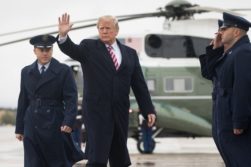
US President Donald Trump has strong words for Iran. Illustrative photo, edited for size. Official White House photo by Shealah Craighead. CC 3.0 license.
Iranian President Hassan Rouhani on Sunday warned the United States they would “regret” fighting with the Islamic Republic and implying that Iran could shut down a critical oil gateway from the Middle East to the world. In response, US president Donald Trump literally responded with all-caps warning of his own on Twitter.
“To Iranian President Rouhani: NEVER, EVER THREATEN THE UNITED STATES AGAIN OR YOU WILL SUFFER CONSEQUENCES THE LIKES OF WHICH FEW THROUGHOUT HISTORY HAVE EVER SUFFERED BEFORE. WE ARE NO LONGER A COUNTRY THAT WILL STAND FOR YOUR DEMENTED WORDS OF VIOLENCE & DEATH. BE CAUTIOUS!” tweeted Trump late Sunday evening.
The American retaliatory warning followed comments from Rouhani to the heads of Iranian diplomatic missions abroad in which the Iranian President referenced the Strait of Hormuz—a critical waterway that is used by Middle Eastern oil tankers to reach Europe and the US—before stating that his country is “guarantor of security of the waterway of the region.” In the talk, which was published to the Iranian President’s website, Rouhani then hinted at taking action to shut down the Strait of Hormuz when he warned the US, “Don’t play with the lion’s tail; you will regret it.” Trump’s fiery tweet came hours later.
That same day, US Secretary of State Mike Pompeo blasted the Iranian regime for abuses against their own people and sponsoring terrorism around the world. Following the rhetoric exchange, Israeli Prime Minister Benjamin Netanyahu expressed his appreciation for “strong position” by the US leaders vis-à-vis Iran.
“I would like to commend the strong position expressed yesterday by President Trump and Secretary of State Pompeo against the aggression of the regime in Iran,” said Netanyahu on Monday in comments released by his office.
“Over the years, this regime has been spoiled by the major powers and it is good to see that the US is changing this klonopin vs generic clonazepam unacceptable equation.”
Pompeo’s speech on Sunday, delivered under the theme of “Supporting Iranian Voices” and republished by his office, highlighted the abuse of power, human rights and economic resources by the Iranian regime. And it’s not just Iranians who are suffering, with Pompeo noting that an Iranian diplomat was charged with providing explosives to bomb a political rally in France.
“This tells you everything you need to know about the regime: At the same time they’re trying to convince Europe to stay in the nuclear deal, they’re covertly plotting terrorist attacks in the heart of Europe,” said Pompeo.
In response to Iran’s abuses at home and aggression abroad, Pompeo reiterated the American plan to use sanctions and international diplomacy to drive Iranian crude exports “as close to zero as possible” by November 4. This is part of a broader plan to target the Iranian regime’s finances in an effort to undercut their self-enrichment and support for “death and destruction.”
“The mission set for our team is clear,” said Pompeo. “It’s to deny the Iranian leadership the resources, the wealth, the funds, the capacity to continue to foment terrorism around the world and to deny the people inside of Iran the freedoms that they so richly deserve.”
Despite the animosity between the US and Iran right now, Pompeo pointed to North Korea as a vision for how two bellicose enemies could start talking peace. Pompeo said that President Trump has said that “if we can get the [Iranian] leadership to make a strategic decision about how to ensure its well-being and the well-being of its peoples, that we’re prepared to have a conversation and to discuss how that might proceed.”
Said Pompeo, “The President has stated at least once, perhaps more than once, that he is prepared to do that with the leadership in Iran, but not until such time as there are demonstrable, tangible, irreversible changes in the Iranian regime that I don’t see happening today. But I live in hope.”
(By Joshua Spurlock, www.themideastupdate.com, July 23, 2018)
